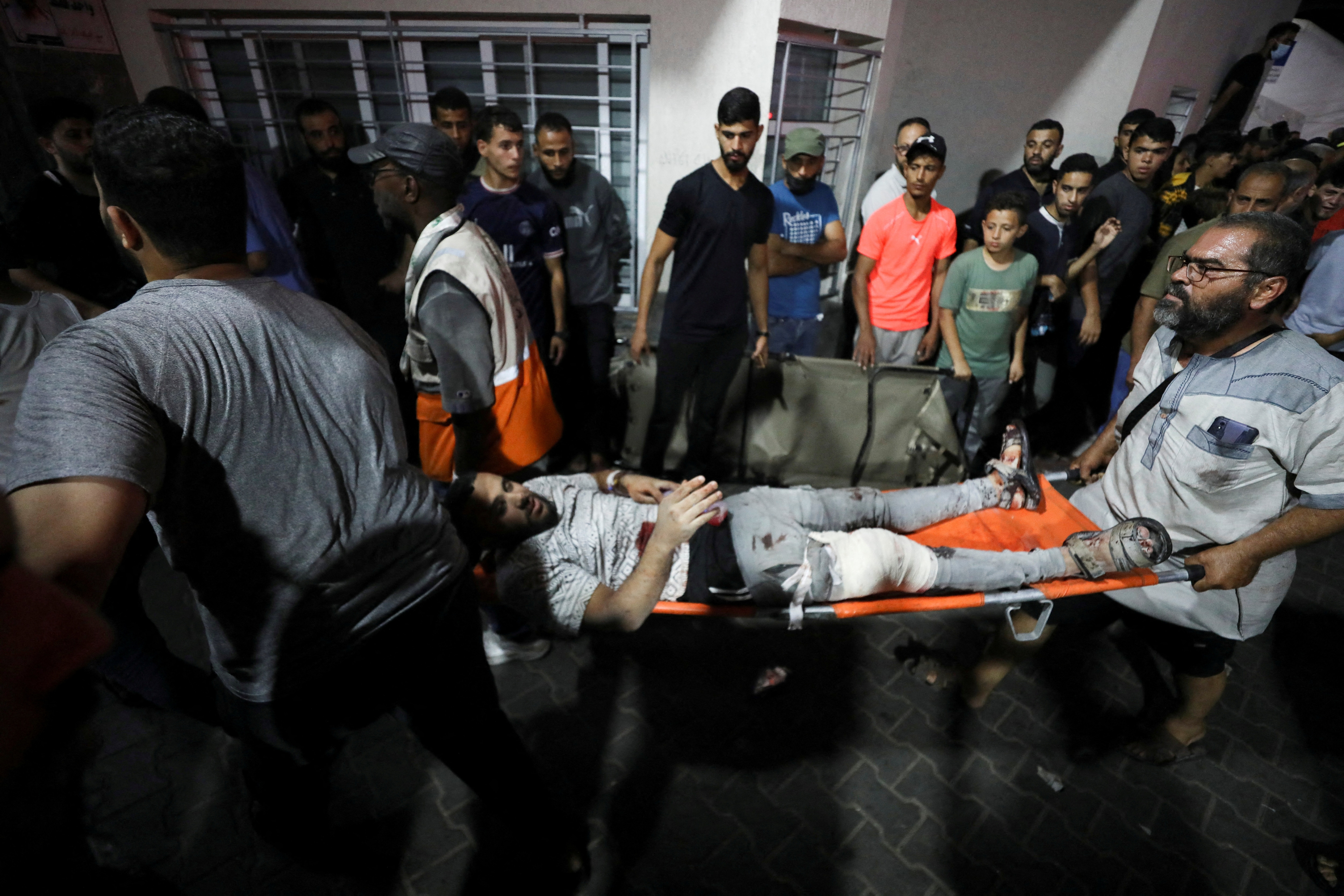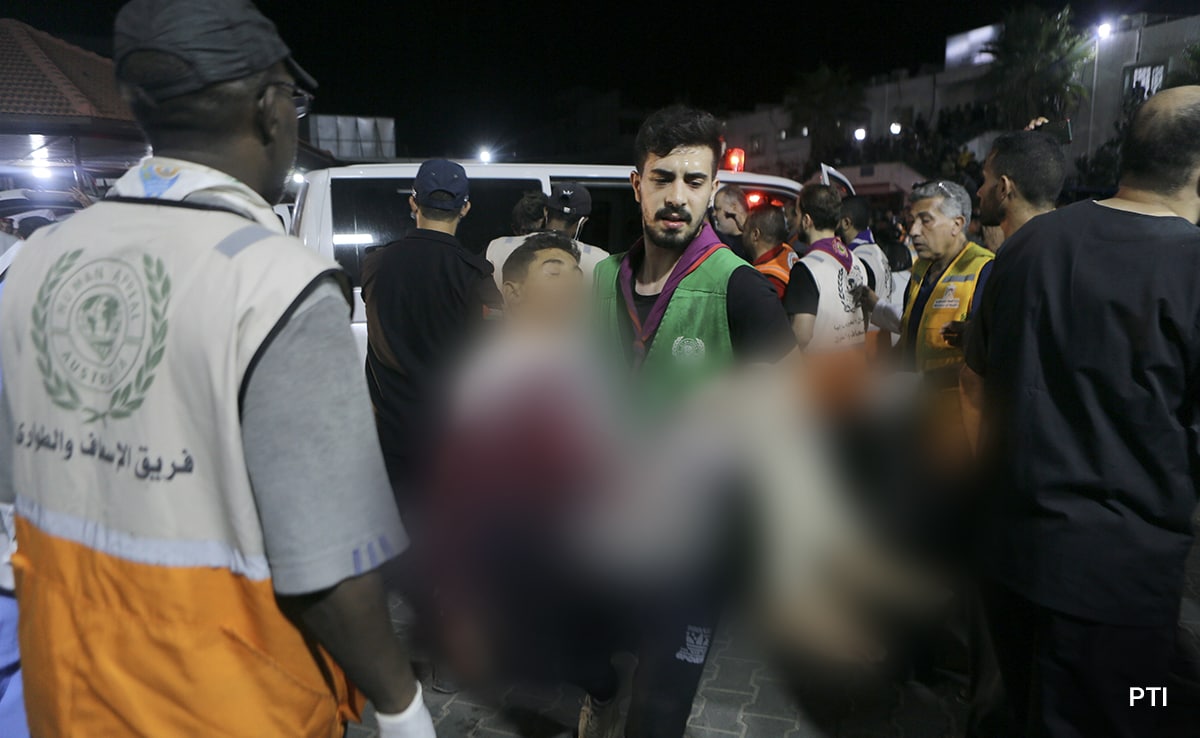
The hospital attack in Gaza has killed 500 people and left many more injured, local officials have said
New Delhi:
When Gaza’s Al Ahli Arab hospital was bombed last night, many of those inside were neither ill nor injured. They had moved in after losing their homes in the war triggered by Hamas’ shocking attacks on October 7. They had hoped the hospital would be a safe shelter amid Israel’s brutal counterstrike. Last night proved them wrong.
The strike on the hospital in central Gaza killed at least 500 people, news agency Reuters reported, quoting Gaza officials. While the local Hamas leadership has accused Israel of striking the hospital, Tel Aviv has claimed that a rocket misfired by Islamic Jihad Palestinian militants hit the health facility.

About a million people have been displaced in Gaza since war began
Photo Credit: Reuters
Hospitals As Shelters
Over a million people out of Gaza’s 2 million population are currently homeless, according to UN estimates. While a section of them have been accommodated in shelters run by humanitarian organisations, many others have taken shelter where they found it. Tens of thousands of families have moved into hospitals.
The health ministry in Hamas-ruled territory has said Ahli Arab hospital was sheltering not only hundreds of sick and wounded, but also people “forcibly displaced from their homes” because of other strikes. According to an AFP report, corridors at Nasser Hospital in Gaza were full of women making bread and drying clothes as doctors fought to save lives inside. “Death might be more merciful,” Amira, 44, told AFP.
Israel forces had earlier asked Gaza residents to move south as they intensify their attack against Hamas. Tel Aviv has claimed Hamas is blocking people from escaping so that they can use them as human shields. Also, the Rafah border to Gaza’s south, the escape route into Egypt, has been shut since the war began.
Hospitals Under Attack
As many as 111 healthcare facilities or vehicles have been targeted since the war began on October 7, the World Health Organization has said. Twelve health workers have died and 24 health facilities, six of them hospitals, damaged. According to the WHO report, three hospitals have suffered heavy damage to the point that they are no longer functioning.

Thousands have taken shelter in Gaza’s hospitals
Photo Credit: PTI
The hospitals that are still running have been hit by the blackout in Gaza after Israel cut off electricity to the Strip. Officials in Gaza have been directing to hospitals fuel available in other public facilities to prevent a complete shutdown, a UN report said. People are also being requested to donate fuel set aside for domestic consumption so that the hospitals can keep functioning. The situation has been worsened as supply of medicines runs out. “An estimated 50,000 pregnant women face extreme challenges to accessing prenatal and maternity care due to risks related to movement, the halt of health facilities, and shortage of lifesaving supplies,” the UN has said.
Crowding Sparks Infection Fears
As more people reach hospitals in the hope of escaping Israel’s airstrikes, the health facilities face risks of disease outbreaks and a hygiene crisis. Speaking to AFP, Amira at Nasser Hospital said it has been a week since they could take a shower. “Our bodies itch all over. It has been a week since we could take a shower,” she said.
The situation is no better at Dar al-Shifa hospital, the biggest healthcare unit in Gaza.
Ibrahim Teyssir, one of thousands seeking refuge there, told AFP, “No one has pity on us. What have we done to deserve this? What have our children done?”
The WHO has said hospitals are at a “breaking point and are overflowing and with people desperately seeking a safe shelter”.

Photo Credit: Gaza hospitals are overflowing with patients as supplies run out
“Crowding is getting worse. Over 30,000 people are sheltering at Shifa Hospital alone,” the UN agency told AFP, quoting Hamas health officials. “We are extremely concerned about disease outbreaks due to mass displacement and poor water and sanitation among people who are already in a dire situation.”
“Death Sentence” And An SOS
Israel’s order to evacuate northern Gaza as it widens its offensive has drawn a sharp response from WHO. The WHO said moving 2,000 patients to hospitals that are already overflowing with patients could be “tantamount to a death sentence”. The health body has called for an immediate end to hostilities and a humanitarian corridor to ensure health supplies reach hospitals.
The WHO has also raised an alarm on how lack of funding may cut access to essential health services. Gaza’s health sector was reeling under a fund crunch even before the war, and the violence has made matters much worse. “The Inter-Agency Flash Appeal, released on 13 October estimated that $ 23.1 million were needed for the immediate response, however this figure will only continue to rise as the situation unfolds,” it has said, adding that unless funding comes in, thousands will lose access to basic healthcare services.




